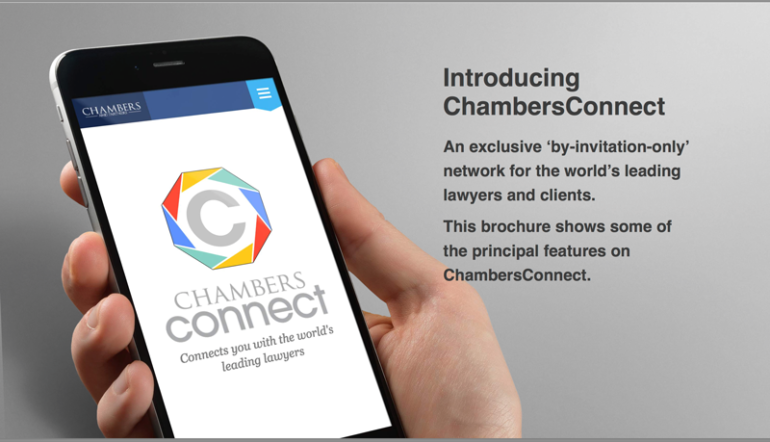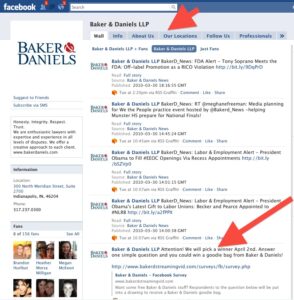Chatter among legal marketers regarding the “exclusive social network” that was just launched by Chambers and Partners—ChambersConnect—has increased. This past week, lawyers flooded our inboxes asking for guidance after receiving their “personal invitation” to join the new network, which promises to be populated with “the world’s leading lawyers” and senior executives in major corporations—conjuring visions of sugar-plum A-list prospects to dance in their heads. Our collective response to one another? “Oh no, here we go again.” (face-palm) “Who wants (has the time) to do the due diligence on this one?” “Where are they getting the client information? I hope it’s not from our submissions.”
So, as you ponder the value or non-value of a walled-garden propagated with lawyers—many of them direct competitors—and their clients (who, if they sign up, will be exposed on a daily basis to other law firms), here you will find my attempt to make some sense of it all. I draw my conclusion in this post’s final paragraphs, yet leave the door open, as always.
Is this a fantasy, based on reality?
The new social networking enterprise from Chambers and Partners, a well known and highly regarded publisher of jurisdictional directories that vet and rank lawyers, makes a very bold claim:
“ChambersConnect is different.”
Among the features (not necessarily benefits) listed are:
- It’s specialised – designed for lawyers and clients.
- It’s exclusive – only open to the world’s leading lawyers (ranked in the Chambers guides) and to senior executives in major corporations.
- This exclusive membership ensures continuing high-quality content.
- Your posts and communications are organised by groups based on industry sectors, legal practice areas, and locations.
To those of us who championed the (failed*) Martindale Hubbell Connected online social networking site, which launched in late 2008, it looks like Chambers just ripped out a page from their playbook. (*Martindale.com Connected will be shutting down in early 2017 in conjunction with a relaunch of Martindale.com.)
And that raises a giant red flag:
Those who don’t know history, are destined to repeat it.
–Edmund Burke
Why did Martindale.com Connected fail?
Despite all good intentions and decent technology on the backend, it is my opinion that they failed because (1) the key players in the community—lawyers—weren’t ready, and (2) more importantly, they didn’t need it. It’s a basic sales strategy: first create the need.
Martindale initially pitched a soft value proposition. It did not speak to any pressing need. For example; get online, make new friends, learn something new, share everything you worked your entire career to know and understand with your competition—stuff like that. This made it impossible for the target community to justify any significant investment of time, let alone understand what the hell Martindale was talking about.
In full disclosure, I was contracted by Martindale Connected, shortly after it launched, to help them work on additional strategy and messaging. As I sat through meetings filled with all types of bright thinkers and talented doers, it was clear to me that the community’s success would be solely dependent on leading a paradigm shift, and I told them as much. For that, I suggested, you need a stronger (and clearer) value proposition. One that would touch on an explicitly known need.
Unfortunately, the only known need (on both sides of the coin) was: “There’s a recession. What am I going to do to make more money!” Though certainly, I believe Martindale thought they were providing a venue that could advance a solution to address that need, in hindsight it was flawed. Hundreds of people looking and no one seeking, masked as a community forum, is a losing combination. It would have been better to be obvious and create a dating-type site, where everyone understood the terms.
We named it “social media” for a reason.
Visionaries described it, defined it, and planted it from seed long before most lawyers were seriously surfing the web.
In 1999, just four years after the World Wide Web opened the internet to commercial business interests, Rick Levine, Christopher Locke, Doc Searls, and David Weinberger published the CLUETRAIN Manifesto. There were 95 theses in their manifesto, prefaced in part with the following statement:
“A powerful global conversation has begun. Through the Internet, people are discovering and inventing new ways to share relevant knowledge with blinding speed. As a direct result, markets are getting smarter—and getting smarter faster than most companies.”
Of the 95 theses they presented in 1999, this one predicted the future as we know it today:
#6: “The Internet is enabling conversations among human beings that were simply not possible in the era of mass media.”
CLUETRAIN also predicted with alarming accuracy that “Corporate firewalls have kept smart employees in and smart markets out. It’s going to cause real pain to tear those walls down. But the result will be a new kind of conversation. And it will be the most exciting conversation business has ever engaged in.”
And this is exactly what Martindale still didn’t understand almost 10 years later in 2008, and I am not convinced that Chambers does now: Lawyers and clients do not engage in “exciting conversation” in a public, or even semi-public forum.
As an aside: Using the original value proposition of social media and networking that it enables one to “get ahead of the markets,” it is antithetical to the legal profession. It assumes a type of external collaboration that is a non-starter in the current state of the majority of the legal profession. Yes, I know for a fact some law firms/lawyers and clients are trying. That is the good news. The bad news is: Can you really collaborate effectively with a thousand people? No. Therefore, it is highly probable that if ChambersConnect succeeds, it will be that it is merely just another marketing platform. Any hope for it achieving something more necessary or urgent, such as moving the market forward, is a true stretch, and the wrong forum. (My free advice, given in the interest of the greater good: Put up the big bucks to hire thought leaders to drive the conversation on smaller forums that interface with places that require little or no additional effort. Stick that in your pipe and smoke it for while…)
So, in a classic sense, I think ChambersConnect is DOA, leaving it’s highest purpose just another marketing tool. How “exciting” will those conversations be? I suspect we shall see…
What could Martindale have done better?
Martindale eventually embraced a key value prop: a “safe space.” At the time, not only were most open social networks banned in law firms, there were other legitimate concerns, some that still exist today. And at least this made sense on the surface. But while it solved one problem, it created others. It was isolated and uninteresting. It was an added distraction. No one engaged, no one got rich, and it died.
To wit, my counsel to them was to take a more active, change-agent role. To create a common cause; e.g., to convince lawyers that they needed each other to move the market. But to do that, they would have to demonstrate how that works and invest in it big time. But they didn’t. It wasn’t really their mission. They viewed themselves as a service provider. They provided a shiny object platform, then threw a hail Mary pass, expecting that the community would catch it and hold on to it across the goal line. They’d be the heroes, the visionaries. More so, their primary product, the directory, would live to see another century. Unfortunately, that pass never “connected.”
In hindsight, they should have been frank with the community: “Don’t worry, you can still make money. That is, as long as it’s not the only thing on your mind.” But of course, that wasn’t going to sail, either, as few lawyers had the time during that intense period for something unrelated to saving their business or making more money. Still, had Martindale been bold, taking that position, I believe it would have mercifully killed the idea of a walled-garden social network for lawyers, sooner. It would have saved hundreds of thousands of dollars on technology and personnel to run a community that never found its purpose.
What must Chambers do now?
Pay attention to the basics.
Thesis #94: “To traditional corporations, networked conversations may appear confused, may sound confusing. But we are organizing faster than they are. We have better tools, more new ideas, no rules to slow us down.”
Thesis #33: Learning to speak with a human voice is not a parlor trick. It can’t be “picked up” at some tony conference.
Thesis #34: To speak with a human voice, companies must share the concerns of their communities.
Perhaps that is too idealistic, so let’s just cut to the chase. The positive angle I see for the Chambers’ venture into social networking is that they have a captive audience of vetted “leading lawyers.”
For example, to achieve leading lawyer status your firm has likely spent hundreds of thousands of dollars and unspeakable hours of lawyer and marketer time to develop submissions. You’ve called in your chips with client referees—over and over again. And you’ve spent more money than God knows to profile your rankings and purchase “badges.” In other words, you’re already invested. This alone may motivate people to register, which I did for one lawyer today. But that doesn’t create a community.
Nor does any of this:
- “It’s exclusive – only open to the world’s leading lawyers (ranked in the Chambers guides) and to senior executives in major corporations.”
- “This exclusive membership ensures continuing high-quality content.”
These statements assume four things that are just too easy to debunk.
(1) Lawyers want to network with other lawyers online.
Really? Lawyers may need to contact other lawyers for information on specialties or jurisdictions; but generally speaking, they are cautious to post anything in writing that could later come back to haunt them. If they need to find another lawyer outside their jurisdiction, are they going to log into a social networking site and post a cattle call? Not likely. They’ll check out directories, ask people they know, or tap into law firm network alliances; then they will pick up the phone, or email. It’s possible that some may throw out a query for help, I know that my colleagues in the “Legal Marketers Extraordinaire” Facebook group do from time to time, but we’re a rather collaborative and open-minded bunch. And, perhaps more importantly, we don’t have “directories” like Chambers and Legal500 to reference, which general counsel and other clients do. Our system grew organically; an important point for another conversation.
Even expecting that social media natives, the millennials and younger, will want to network online with other lawyers is stretch. Truth is, they won’t be there anyway. Most have not yet reached the echelon of Chambers membership. They are not yet “leading lawyers,” so don’t look to them for help in making the community “exciting.”
(2) Senior company executives want to network with outside lawyers in a semi-public forum.
Sure, some may, but overall (a) they will not likely ask or tell anything of importance—because they can’t—and (b) they do not want to be marketed-to, which is bound to happen if there is any whiff of prey.
As an aside, one of the first posts I saw today in the pre-launch version promised an article on a substantive matter of law, but within the first paragraph, it spent two sentences boasting the firm’s practice. UGH!
(3) Senior executives don’t already have access to enough high-quality content.
This is truly an error in thinking. There are numerous existing channels for access to high-quality content written by lawyers, for companies. In fact, so many that we can’t keep up with them; Mondaq, Lexology, JDSupra, The Lawyer, news media, industry-specific blogs and publications, RSS feeds, and legal journals; not to mention email blasts from dozens of law firms—which general counsels say they only have time to look at the first one over the transom, thank-you very much.
Executives are suffering from content overload. If Chambers thinks they’re going to win with the content race, they had better have something new up their sleeve.
(4) Lawyers (or their marketing staff) have enough time to spare that they will eagerly re-post the content they’ve already posted elsewhere.
See #3.
Conclusion
While we may remain puzzled, there is a bottom line:
(1) The Connect community is currently designated as free, but the devil sitting on my right shoulder tells me that a meeting room of executives conceived to establish this community in order to sell paid profile placements, ads, featured content, etc. etc. etc., ad nauseam. Be prepared to strike yet another check, but wait to see who shows up. And don’t rely on their statistics, they won’t be granular enough to assess with any veracity. Instead, get on the site daily and see what’s happening. If it’s exciting, you may want to take the bait.
(2) The angel on my left shoulder says: “Wait, wouldn’t a platform that allows you to post substantive content that prospective clients can access in addition to the brief write-up in the ranking, or 150-word profile bio, be really helpful? It will allow prospects to dig deeper into the particular attorney expertise. It could help them determine whether they might be a good hire, e.g. if the attorney had written on specific subject that they were currently addressing.” “No, way,” says the devil. “You’re actually expecting the busy corporate executive/GC to visit the main Chambers website, then login to, or register for, the social network and acclimate themselves just to find what a particular attorney is writing about? Why not just jump to the attorney’s website bio page and find all their recent articles there?”
(3) “Ah ha!” says the angel. “I’ve got it. Surely Chambers’ researchers and editors will be trolling the community, seeking insight regarding those they are being asked to evaluate. AND, they may even ‘reward’ those attorneys who publish subject matter content or engage in Q&A with a boost in rank!”
That’s it! The true value prop goes to #3—the darling angel. If the network survives, it will make it easier to interact with those who hold your Chambers’ destiny in their hands. According to those in the know—former Chambers researchers and editors who now consult on boosting rankings and submitting winning applications—it is important to “keep in touch” with Chambers personnel during the year and to notify them of announcements and publications. The Connect community will certainly make that easier for you and them.
All punchy stuff aside: I truly wish ChambersConnect the best. I will be at the ready to assist my attorneys in any manner that will help them and the network be a respectable success. With one caveat. As some very wise marketing professionals advise: Don’t abandon the spaces you are already invested in, but give it a try if you have the time.
I couldn’t agree more.
Markets are conversations. Let’s converse!
UPDATE: New development. Chambers USA Guide firm profile package has US $250 cost increase this year. The reason? Added features. The features? The ability to add articles, media mentions, and press releases to the ranked attorney’s profile. Will this content be linked to the Chambers Connect? No. It’s separate. So, there you go. Another great example of poor planning. They are suggesting we post articles to the main Chambers directory, AND do it again on the social network. I’m afraid, all other issues aside, this alone dooms the network. Who has time for that?





Great article. With all niche social sites, one of the biggest challenges is having a reason to return (in effect, ‘consumption’ on the platform). In the legal industry – even outside the curated Chambers list – the social norms of attorneys are at odds with this. What I’ve seen with several attorney social networks is that they end up either a ghost town, or a venue of re-posted content (much like LinkedIn groups have become) with no real participation.
My suspicion is that attorneys will be reluctant to invest much time in the network, and in-house counsel would prefer curation to more content.
But, like you, I wish them the best – perhaps they’ll crack the code this time!